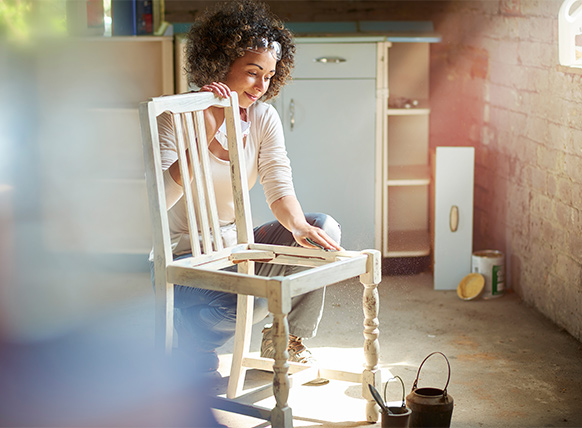Seven ways you can help tackle the climate crisis
It’s time to act on the climate crisis today, not one day. Read on for seven ways you can take action for climate.




How to help stop the climate crisis
It’s time to act on the climate crisis today, not one day. And we all have a part to play. By making some small - and a few more major - changes around your home, we can help to reverse the dangerous effects that the climate crisis is having on our planet:
- Try to reduce how much you consume, reuse what you can and recycle where possible
- Power your home with renewable electricity
- Choose low-carbon heating with an air source heat pump
- Travel more sustainably with public transport and electric vehicles
- Reduce food waste and consider a more plant-based diet
- Make sustainable fashion choices
- Share and pass on your top tips to encourage others to take action for climate
What is the climate crisis?
There is irrefutable evidence of the impact that climate change is having on our planet. The Earth is warming at an unprecedented rate, meaning that our climate is now classed as being in a crisis1. The release of carbon emissions into the atmosphere from burning fossil fuels have caused dangerous changes to our climate, leading to excessively high temperatures, forest fires, droughts and floods.
Read on for more information and tips on how you can help stop the climate crisis.
1. Reduce, reuse and recycle
Reducing your use of single-use plastics is an easy way to help the environment. Most of us already reuse plastic carrier bags or use cloth alternatives when shopping, have swapped single-use coffee cups for a thermos and invested in reusable water bottles.
Another easy change is to avoid items in plastic packaging when you can by buy them without, such as opting for loose fruit and vegetables or items in recyclable cardboard rather than plastic packing. Make recycling even easier by labelling your recycling boxes to help you sort your waste and flatten cardboard boxes, plastic bottles and cans to maximise the space.


Before you buy anything for your home consider the impact it might have on the environment and whether there is a greener, more sustainable alternative. Once you go looking for them, you'll be surprised how many reusable versions of traditionally single-use household items there are. You can ditch cling film for reusable beeswax food wraps, line baking tins with reusable baking liner rather than disposable baking paper, and you can even reuse glass food jars for storage.
There are sustainable actions you can take in the garden too. Instead of buying bags of compost for planting, invest in a garden composter so you can use your food waste to grow your plants. And you can reduce the amount of smoke you release into the atmosphere every time you barbecue by switching to more eco-friendly coconut charcoal.
2. Power your home with renewable electricity
One of the best ways to help prevent further damage to our climate is to choose renewable energy sources.
You can help protect the environment and cut your carbon emissions by installing solar panels to generate renewable electricity from the sun. By choosing to power your home’s appliances with solar you help to reduce the greenhouse gases and harmful pollutants emitted by burning fossil fuels to generate electricity.
And install a solar battery to store the electricity you generate and reduce your reliance on the grid even more. Storing your electricity to use when it best suits you, means you can use more of your own renewable electricity. You can even earn money by selling any excess electricity generated through the Smart Export Guarantee (SEG).
If you’re an E.ON Next customer, you’ll already benefit from 100% renewables-backed electricity as standard2 – meaning that any electricity you use from the grid is backed by renewable sources such as wind, solar and biomass.
3. Decarbonise your heating
Improving the energy efficiency of your home’s heating reduces the amount of energy needed to comfortably heat your home and lowers your carbon footprint as a result.
Consider investing in an air source heat pump to generate your own cleaner heat. This environmentally friendly energy source heats your hot water and radiators or underfloor heating and is around 3 to 4 times more efficient than LPG, oil, electricity and gas boilers3. And with the UK Government’s Boiler Upgrade scheme, you could save £5,000 on the cost of installing a new air source heat pump.
But if you’re not yet ready for a heat pump, upgrading to a new A-rated, gas boiler, which runs on far less energy than older, inefficient boilers can help to cut the energy you use to heat your home and hot water.
And to make your heating more energy efficient, fit a smart thermostat and individual smart radiator thermostats to each of your radiators.


4. Choose sustainable travel
We need to reduce our reliance on fossil-fuelled travel, which releases carbon emissions and polluting gases into the atmosphere.
Choosing public transport instead of air travel and walking or cycling short journeys instead of driving can help. Or why not consider car sharing to help reduce the number of cars, and carbon emissions, on the road.
If you’re in the market for a new car, switch to an electric vehicle. Electric vehicles don’t produce any exhaust emissions, meaning your electric car won’t produce the greenhouse gases or air pollutants which contribute to smog and health problems.
You can minimise your carbon footprint even further by charging your car at home, either using the electricity from your solar panels or with a 100% renewables-backed electricity supply2.
5. Eat more sustainably
There are many ways that what and how we choose to eat can either contribute to or reduce the impact we have on the planet.
Simple changes such as eating what’s in season, shopping from local growers and producers and eating a more plant-based diet can all help to reduce the carbon emissions associated with the food we eat.
In the UK, we throw away 4.5 million tonnes of food from our homes4 and tackling this is key to tackling the climate crisis. Only buy what you need, use up any leftovers to create a delicious, new meal and freeze anything you won’t use immediately.
For more tips on how to more sustainable in the kitchen, follow us on Instagram @eonenergyuk where we’ve partnered with some of the best sustainable chefs in the UK to inspire you with a summer of planet friendly cooking.
6. Rethink your wardrobe
It’s easy to get swept up in the latest trends, but the fashion industry is responsible for around 10% of the world's greenhouse gas emissions5 so making some small changes to your fashion choices can have a big impact.
Being more mindful when it comes to clothes shopping can help you to select a few timeless pieces, in good quality fabric, that you can wear again and again – rather than flimsy, generic fast fashion. And you don’t need to buy new either. Why not consider buying second-hand clothes from charity shops, vintage shops and apps such as Depop or Vinted – or even renting an outfit for special occasions.
You can also increase the lifespan of your clothes by washing them less frequently as well as repairing any loose hems, missing buttons or holes. And if you no longer love the clothes in your wardrobe, give them to charity, sell them or recycle them.


7. Share and pass on your top tips
The more people make these switches and become more sustainable at home, the quicker we’ll help stop climate change. So encourage your friends, family and local community to reduce their carbon footprint too and spread the word by sharing this blog on your social media channels.
1. Nasa: Climate Change: How Do We Know?
2. Electricity sourced from E.ON’s renewable generation assets, supply agreements with independent UK wind generators and the purchase of renewable electricity certificates. The electricity supplied to your homes comes from the National Grid. Find out more at eonenergy.com/renewable
3. Based on a Daikin heat pump installed by E.ON.
4. BBC: The simple formula to cut your diet’s carbon footprint
5. BBC: Can fashion ever be sustainable?